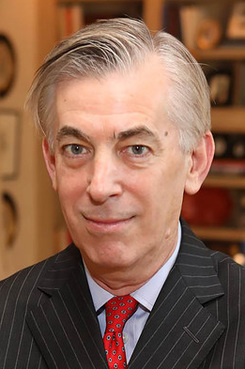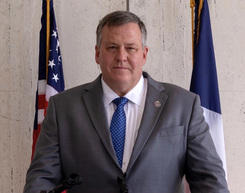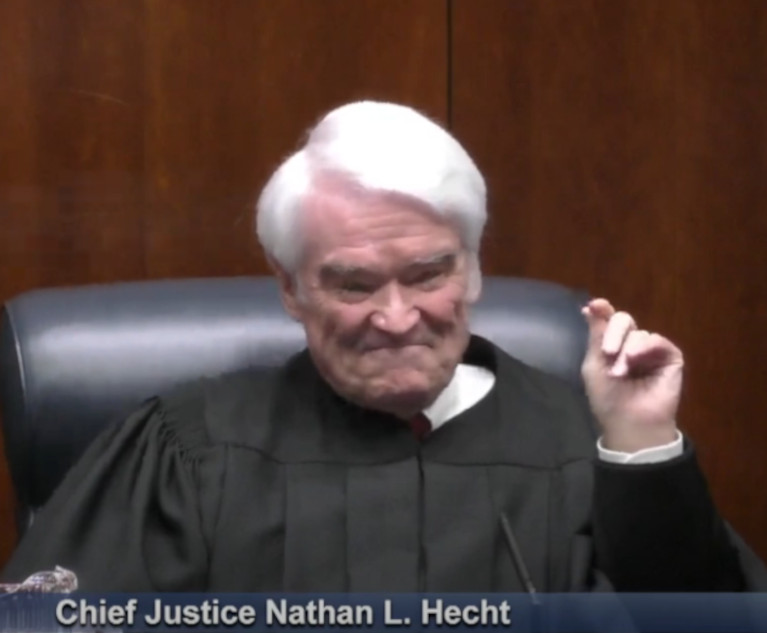2 Houston Civil Litigators Go Outside the Box to Win 'Actual Innocence' Case
“I wasn't trying to free a man or convict a man," said John Raley, appointed special prosecutor in the Alfred Dewayne Brown case. "I was trying to determine where the evidence leads."
May 06, 2019 at 06:40 PM
5 minute read
 Prison bars. Photo: Shutterstock.com
Prison bars. Photo: Shutterstock.com
Two lawyers who are well-known in Texas for their pro bono social impact litigation have been serving out-of-the-norm roles on both sides in a recent, unusual actual innocence, or plain error, case.
Houston-based civil litigators John Raley, as a special prosecutor, and Neal Manne, who represents Alfred Dewayne Brown, were on both sides of the bar when a judge on May 3 declared Brown innocent of a 2003 murder of a police officer.
Brown was wrongfully convicted in 2005 and spent 12 years on death row. The Texas Court of Criminal Appeals in 2014 overturned the conviction and found that prosecutors withheld evidence—phone records that backed up Brown's alibi—and ordered Brown to get a new trial. Rather than retrying him, then-Harris County District Attorney Devon Anderson dismissed the case, and the state released Brown from prison in 2015.
Manne, managing partner of Susman Godfrey in Houston, is also well-known for winning a ruling that Harris County's money bail practices for misdemeanors are unconstitutional. Texas Lawyer named him “Attorney of the Year” in 2017 for the ruling, which was upheld on appeal in 2018. In a newer case, Manne represents plaintiffs who allege the felony bail system is also unconstitutional. Manne's role in Brown's case was helping him win compensation from the state for his wrongful conviction.
 Neal Manne of Susman Godfrey.
Neal Manne of Susman Godfrey.“He is very deserving. What happened to him was a nightmare and I feel he should be compensated, if there's a way we could achieve it under Texas law,” he said.
Yet getting state compensation turned out to be harder than it looked. There was no finding of “actual innocence” in Brown's case, explained Manne. To get that key finding took more than three years. Current Harris County District Attorney Kim Ogg reopened the case and appointed Raley as a special prosecutor to investigate whether Brown should be reindicted or declared actually innocent.
Raley has made a name for himself as a pro bono defense lawyer for Michael Morton, who was exonerated and declared innocent after spending more than 24 years in prison on a wrongful conviction for killing his wife. Raley has helped to free two other wrongfully convicted people since then, but always on the defense side. He jumped the bar to work for the prosecution, for pay, in the Brown case.
“I wasn't trying to free a man or convict a man. I was trying to determine where the evidence leads: Should Brown be reindicted for capital murder, or declared actually innocent or something in the middle?” said Raley, partner in Raley & Bowick in Houston.
 Alfred Dewayne Brown
Alfred Dewayne BrownBrown had always maintained his innocence and said he was at his girlfriend's house, and had used his girlfriend's home phone to call his girlfriend at work, at the time of the murder.
Raley's 185-page report on Brown's case explained that the Houston Police Department homicide detective who worked on the investigation obtained phone records that showed Brown had made that important phone call. The detective sent an email to the lead prosecutor, Dan Rizzo, saying that the evidence backed up Brown's alibi. Yet Brown's defense attorneys never received that exculpatory evidence. Also, the original copy of the phone records somehow disappeared from police and prosecutor case files. They finally surfaced when the homicide detective in the case found photocopies of them in a box in his garage.
 Special Prosecutor John Raley.
Special Prosecutor John Raley.“After 10 months of work and exhaustive analysis of all of the evidence, it is apparent that no reasonable juror would convict Brown under the current evidence, which is the legal definition of actual innocence,” said Raley, who noted that witnesses in the case had recanted their testimony or given internally inconsistent statements. The only two witnesses who were consistent all along were Brown's two alibi witnesses, he said.
There was a quirky procedural hurdle to get the actual innocence finding. A court had already dismissed Brown's case in 2015; and 351st District Judge George Powell was unsure if his court had jurisdiction over a closed case, the Houston Chronicle reported. Actual innocence findings typically come through a writ of habeas corpus, Powell explained, but a defendant can't file a writ on a closed case. Prosecutors could charge Brown again and then dismiss the case for actual innocence, which would be absurd, Powell said. The Chronicle reported that in the end, Powell decided the law was meant to compensate people like Brown.
The court signed a May 3 order that said the case “is dismissed due to Alfred Dewayne Brown's actual innocence.”
“I'm excited for him,” Manne said, adding that Brown is “really happy to feel his name has now truly been cleared.”
Read the special prosecutor's report.
This content has been archived. It is available through our partners, LexisNexis® and Bloomberg Law.
To view this content, please continue to their sites.
Not a Lexis Subscriber?
Subscribe Now
Not a Bloomberg Law Subscriber?
Subscribe Now
NOT FOR REPRINT
© 2025 ALM Global, LLC, All Rights Reserved. Request academic re-use from www.copyright.com. All other uses, submit a request to [email protected]. For more information visit Asset & Logo Licensing.
You Might Like
View All
ExxonMobil Sues California AG Bonta, Environmental Groups for Advanced Recycling 'Smear Campaign'

2 Judges: Meet the New Chief Justice and the GC Who Just Rose to the Bench
3 minute read

Trending Stories
- 1'Not the President's Personal Lawyer': Lawyers Share Concerns Over How AG Pick Bondi’s Loyalism to Trump May Impact DOJ
- 2US Judge OKs Partial Release of Ex-Special Counsel's Final Report in Election Case
- 3The Demise of Truth and Transparency in Federal Sentencing
- 4Former Phila. Solicitor Sozi Tulante Rejoins Dechert
- 5'I've Seen Terrible Things': Lawyer Predicts Spike in Hazing Suits
Who Got The Work
Michael G. Bongiorno, Andrew Scott Dulberg and Elizabeth E. Driscoll from Wilmer Cutler Pickering Hale and Dorr have stepped in to represent Symbotic Inc., an A.I.-enabled technology platform that focuses on increasing supply chain efficiency, and other defendants in a pending shareholder derivative lawsuit. The case, filed Oct. 2 in Massachusetts District Court by the Brown Law Firm on behalf of Stephen Austen, accuses certain officers and directors of misleading investors in regard to Symbotic's potential for margin growth by failing to disclose that the company was not equipped to timely deploy its systems or manage expenses through project delays. The case, assigned to U.S. District Judge Nathaniel M. Gorton, is 1:24-cv-12522, Austen v. Cohen et al.
Who Got The Work
Edmund Polubinski and Marie Killmond of Davis Polk & Wardwell have entered appearances for data platform software development company MongoDB and other defendants in a pending shareholder derivative lawsuit. The action, filed Oct. 7 in New York Southern District Court by the Brown Law Firm, accuses the company's directors and/or officers of falsely expressing confidence in the company’s restructuring of its sales incentive plan and downplaying the severity of decreases in its upfront commitments. The case is 1:24-cv-07594, Roy v. Ittycheria et al.
Who Got The Work
Amy O. Bruchs and Kurt F. Ellison of Michael Best & Friedrich have entered appearances for Epic Systems Corp. in a pending employment discrimination lawsuit. The suit was filed Sept. 7 in Wisconsin Western District Court by Levine Eisberner LLC and Siri & Glimstad on behalf of a project manager who claims that he was wrongfully terminated after applying for a religious exemption to the defendant's COVID-19 vaccine mandate. The case, assigned to U.S. Magistrate Judge Anita Marie Boor, is 3:24-cv-00630, Secker, Nathan v. Epic Systems Corporation.
Who Got The Work
David X. Sullivan, Thomas J. Finn and Gregory A. Hall from McCarter & English have entered appearances for Sunrun Installation Services in a pending civil rights lawsuit. The complaint was filed Sept. 4 in Connecticut District Court by attorney Robert M. Berke on behalf of former employee George Edward Steins, who was arrested and charged with employing an unregistered home improvement salesperson. The complaint alleges that had Sunrun informed the Connecticut Department of Consumer Protection that the plaintiff's employment had ended in 2017 and that he no longer held Sunrun's home improvement contractor license, he would not have been hit with charges, which were dismissed in May 2024. The case, assigned to U.S. District Judge Jeffrey A. Meyer, is 3:24-cv-01423, Steins v. Sunrun, Inc. et al.
Who Got The Work
Greenberg Traurig shareholder Joshua L. Raskin has entered an appearance for boohoo.com UK Ltd. in a pending patent infringement lawsuit. The suit, filed Sept. 3 in Texas Eastern District Court by Rozier Hardt McDonough on behalf of Alto Dynamics, asserts five patents related to an online shopping platform. The case, assigned to U.S. District Judge Rodney Gilstrap, is 2:24-cv-00719, Alto Dynamics, LLC v. boohoo.com UK Limited.
Featured Firms
Law Offices of Gary Martin Hays & Associates, P.C.
(470) 294-1674
Law Offices of Mark E. Salomone
(857) 444-6468
Smith & Hassler
(713) 739-1250






